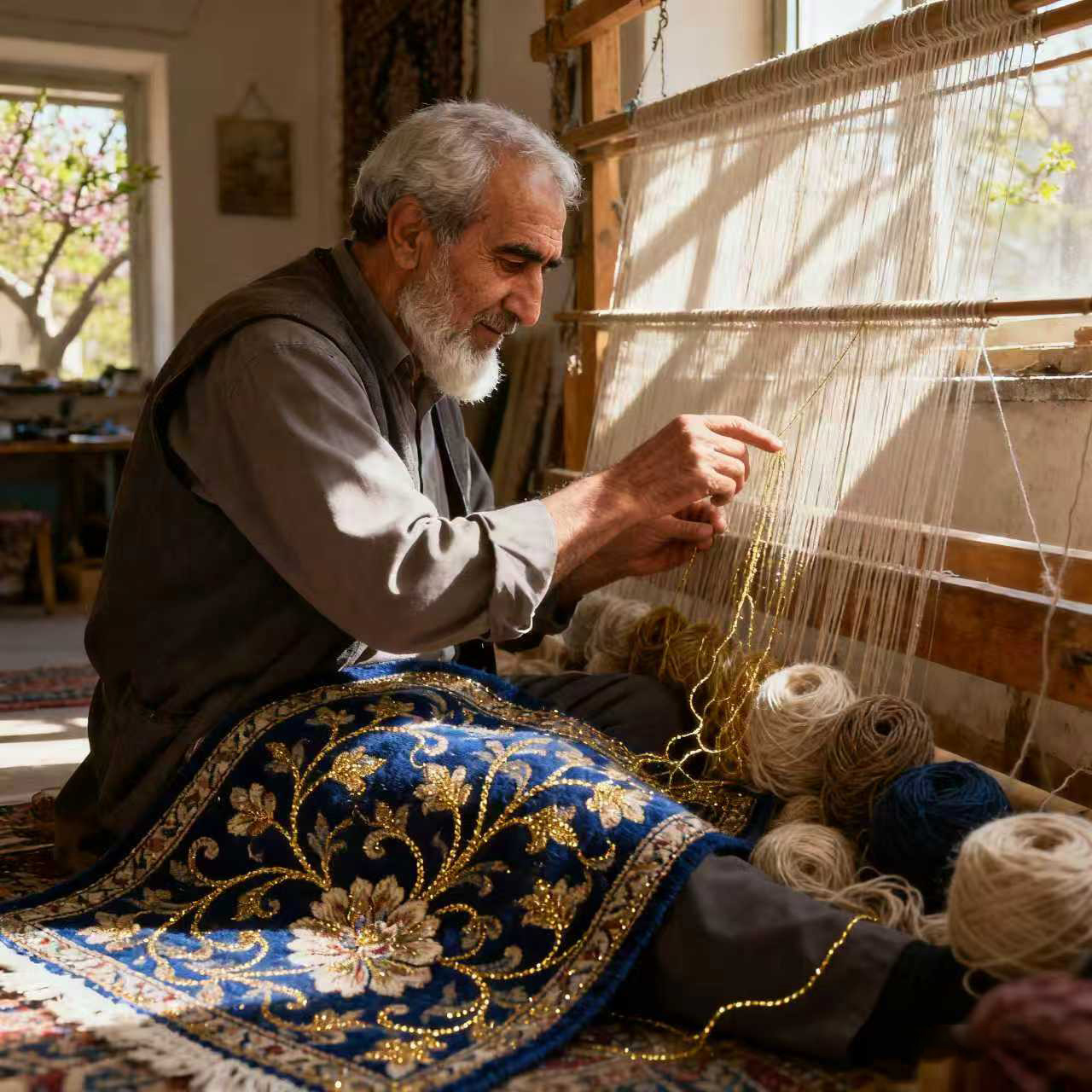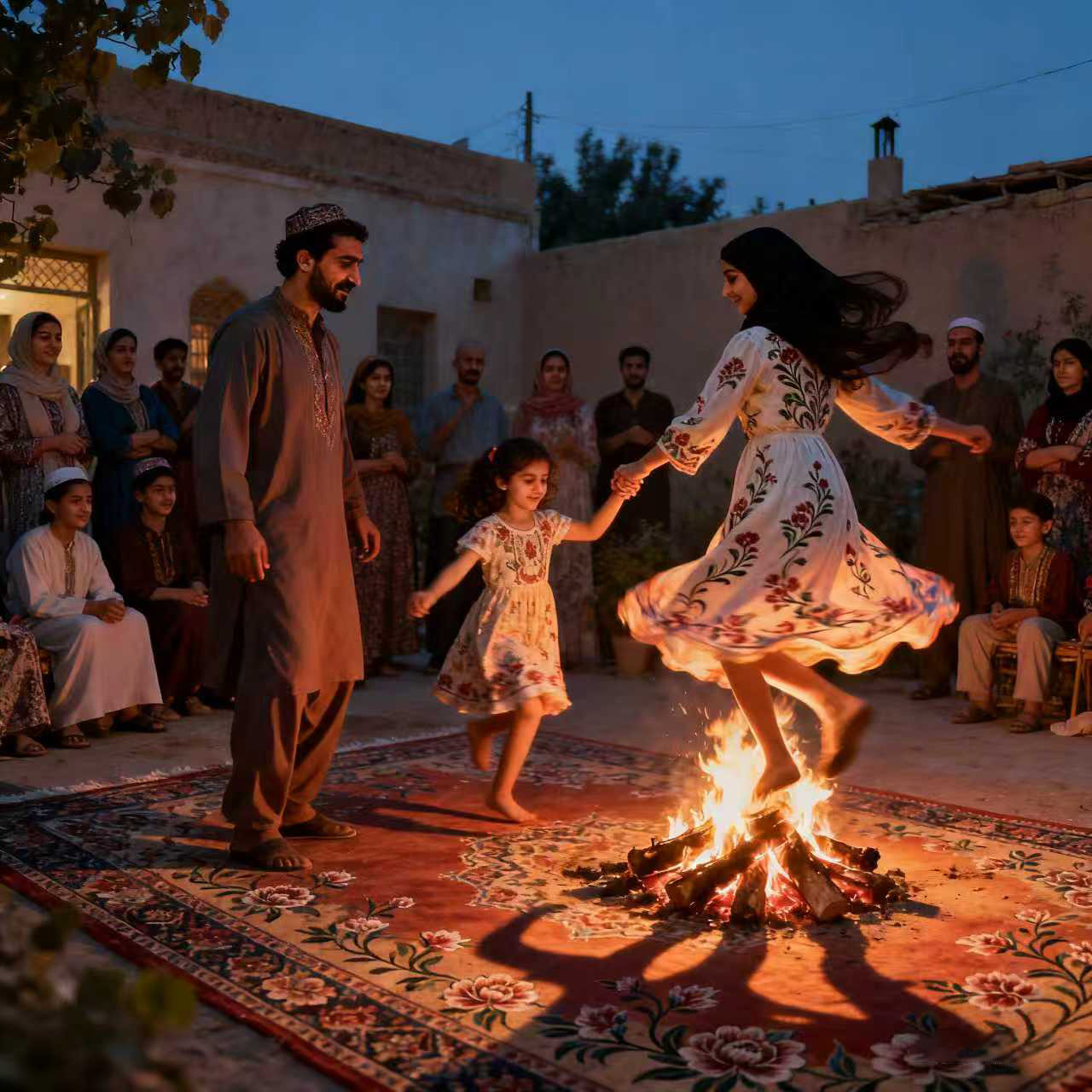+86-13516938893
Menu
global purchase

When Hassan’s fingers wove through balls of wool, he always remembered his father’s words—“Every thread of a Persian carpet should hold the warmth of the sun.” That spring afternoon in Tehran, sunlight slanted into his workshop, falling on the carpet he had been weaving for half a year. Against the indigo background, the patterns of intertwined lotus flowers unfurled slowly, while golden threads glinted with tiny sparks of light in the sun.
Nowruz, the Persian New Year, was only three days away, yet the Haft-Seen table remained empty. Hassan should have been arranging seeb (apple, symbolizing health), sonbol (hyacinth, for rebirth)—and sir (garlic, for warding off evil) and serkeh (vinegar, for patience)—with his wife Fatima. But as he stared at the unfinished pomegranate pattern on the carpet’s edge, his throat tightened. This was the third carpet he had failed to sell that year. Young people now bought machine-woven printed fabrics, complaining that handwoven carpets were heavy and overpriced. No new customers had stepped into his workshop for half a month.
“Grandpa!” The wooden door burst open, carrying a breeze scented with flowers. His 16-year-old granddaughter Leila rushed in with her schoolbag, jasmine petals still stuck in her hair. She knelt beside the carpet, her fingertips brushing the golden-threaded pomegranate: “The seeds of this pomegranate look even plumper than the ones in Grandma’s dessert last year.”
Hassan smiled and handed her a cup of freshly brewed saffron tea. “Your father said you’ve been learning to film videos at school?”
“Yes!” Leila’s eyes lit up as she pulled out her phone. “I filmed the apricot blossoms on campus and the Nowruz fire-jumping ritual our teacher taught us—so many people liked them!” Then she noticed the account book on his desk, where the word “unsold” was circled in red, sharp enough to sting. “Grandpa, about your carpets…”
Hassan said nothing, only touching the wool at the carpet’s edge—it was autumn wool from Isfahan’s pastures, dried in the sun for forty full days to achieve such softness. Years ago, his father had spent three years weaving a carpet for the shah, never leaving his workshop once. In the end, his knuckles had become gnarled and deformed, but back then, the carpet shop had been far busier than it was now.
“Grandpa, can I film your carpet?” Leila suddenly asked. “Look at this pomegranate pattern—every seed’s golden thread is unique. Machines can never weave this.”
Hassan nodded, hesitatingly. He watched as Leila knelt by the carpet, her phone camera panning slowly over the patterns. Softly, she murmured, “This golden thread was woven by Grandpa at dawn, when the moon was still hanging outside the window; this cluster of indigo was dyed with indigo grass from Qom, soaked seven times to get this rich hue…”
That night, Leila posted the video online. She added no fancy filters—only the sound of Hassan’s breathing as he wove, and a caption: “My grandpa’s carpet holds the spring of Tehran.”
The next morning, Hassan was woken by a knock at the door. Outside stood three young people, holding phones, their voices excited: “Are you Master Hassan? We saw Leila’s video and want to see that pomegranate carpet!”
Suddenly, the sunlight in the workshop felt crowded with life. The young people knelt by the carpet, their exclamations as they brushed the golden threads like spring raindrops falling on flower petals. When someone asked about the meaning of the intertwined lotus, Hassan repeated what his father had taught him: “Lotus flowers bloom in water, but their roots run deep—just like our lives. No matter how hard things get, we must hold fast to our roots.” When another asked about the technique of weaving with golden threads, he demonstrated how to wrap the threads around wool: “You must be as gentle as holding a baby, or they’ll break.”
By evening, the first girl to arrive had bought the pomegranate carpet, saying she wanted to give it to her older sister, who was getting married. “A carpet like this will weave warmth into her days,” she said. As Hassan held the money in his hand, he suddenly remembered his father’s last moments—how he had pressed a final strand of golden thread into Hassan’s palm. Back then, Hassan had been about Leila’s age. Clutching the thread, he had asked, “What if no one buys our carpets?” His father had smiled and said, “As long as there’s light in the threads, someone will always see it.”
On Nowruz day, a new item joined the Haft-Seen table—a small strand of golden thread, placed between the apple and garlic. Leila was teaching Hassan to read comments on his phone; the screen was filled with messages: “I want to order a carpet with sunflowers!” “Can you teach me to weave simple patterns?” Fatima brought out saffron rice, its aroma mingling with sunlight, filling the room.

As dusk fell and neighbors gathered in the yard for the fire-jumping ritual, Hassan watched Leila take her young niece’s hand and step over the burning bonfire. The shadow of her dress sweeping across the ground looked just like the swaying lotus patterns on his carpet. In that moment, he finally understood: the “warmth of the sun” his father had spoken of was never just woven into carpets—it lived in the tips of Leila’s fingers as she held her phone, in the wonder in the young people’s eyes, and in every day we choose to hold onto our traditions. It flowed on, never fading.
A night breeze drifted through the workshop window. On the newly started sunflower carpet, the first golden thread glinted softly.